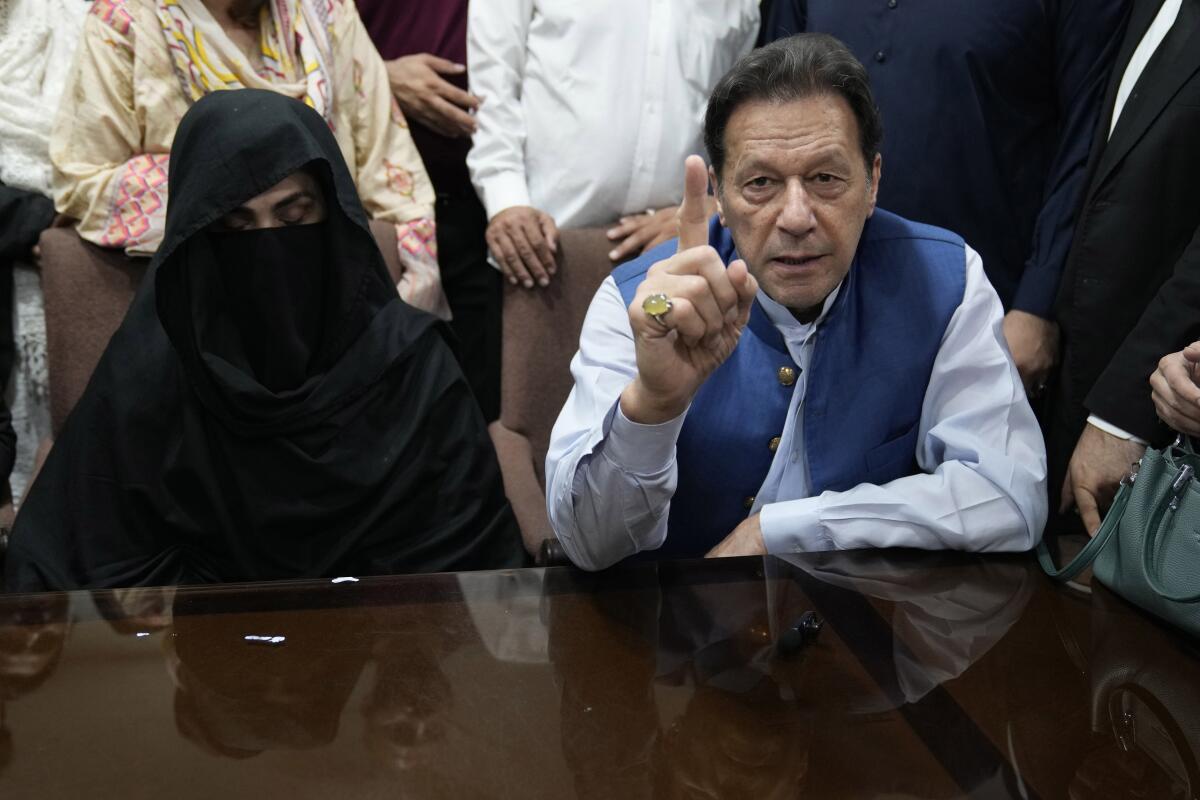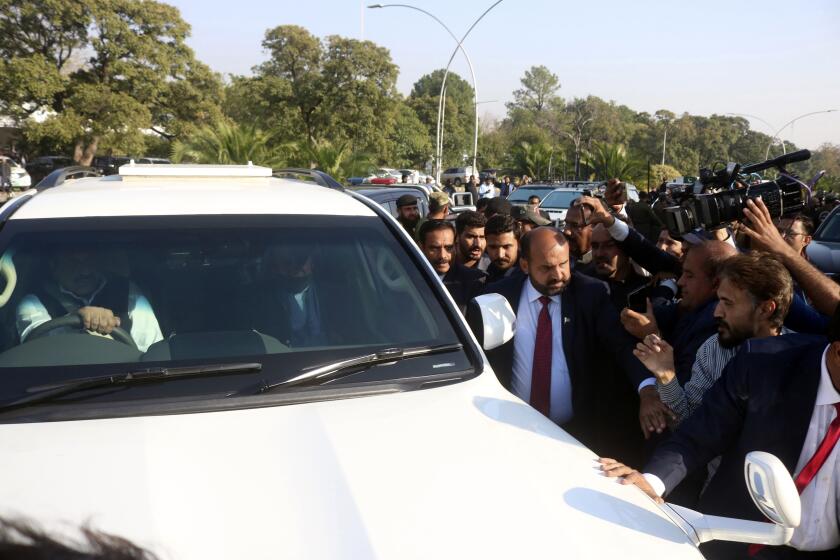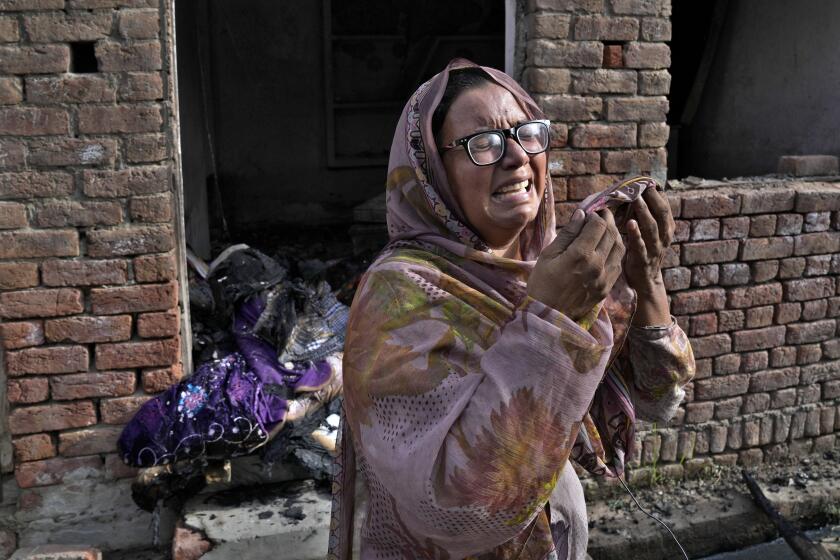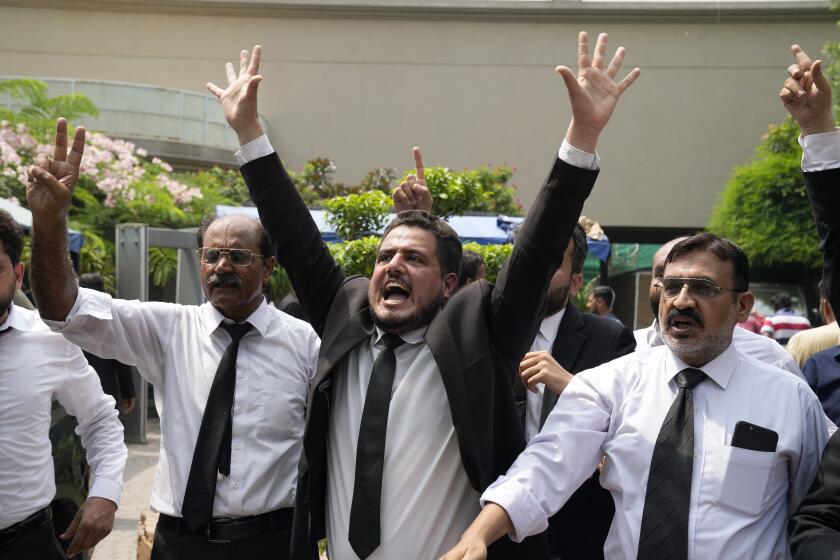Imprisoned ex-Pakistani leader Imran Khan convicted again, days ahead of election

- Share via
ISLAMABAD, Pakistan — Former Pakistani Prime Minister Imran Khan was found guilty of corruption Wednesday and sentenced to 14 years in prison, yet another blow to the imprisoned populist leader days before his political movement attempts a return to power in parliamentary elections.
It was his second conviction in two days and the harshest one yet, and was the latest episode in the long-running battle between Pakistan’s powerful military and its civilian leaders.
Khan and his wife, Bushra Bibi, who was also convicted Wednesday, were accused of retaining and selling state gifts in violation of government rules whenhe was in power. In addition to his prison term, Khanwas disqualified from holding any public office for 10 years.
His lawyer, Babar Awan, dismissed the conviction as a violation of Khan’s basic rights and said the former premier was convicted and sentenced in such a hurry that the judge did not wait for the arrival of his legal team.
Khan — who in the waning days of his premiership began to challenge the country’s military — was ousted from power in a no-confidence vote in April 2022. He now has more than 150 legal cases hanging over him.
Still, the former cricket star remains intensely popular. Pakistan saw violent demonstrations — including ones that targeted military installations — after Khan’s arrest last year.
A Pakistani court acquits former Prime Minister Nawaz Sharif in a graft case, removing a major obstacle for him to run in parliamentary elections.
Authorities have since cracked down on his supporters and his Pakistan Tehreek-e-Insaf party, or PTI, making further rallies unlikely. Many of his party’s candidates have been disqualified from contesting the Feb. 8 parliamentary elections.
Pakistan has a history of arresting former prime ministers or sidelining them ahead of elections if they are deemed to pose a challenge to the security establishment, which has long held significant sway in civilian politics. More than two-thirds of its civilian rulers have been arrested, convicted or disqualified since the country gained independence from Britain in 1947.
But even given this history, analyst Azim Chaudhary said the rapid succession of Khan’s convictions — three in about six months — was unusual.
“The message is Imran Khan will remain behind bars for a longer time if he does not change his rhetoric against the country’s institutions,” said Chaudhary, who is an independent, Islamabad-based analyst.
This week’s airstrikes between Iran and Pakistan mark a significant escalation in fraught relations between the neighbors.
With Khan fighting legal battles, his rival, three-time premier Nawaz Sharif, has a clear path to a fourth term in office. Sharif was hobbled by legal cases and prison sentences, but the Supreme Court and other courts have acquitted him of all charges and scrapped a lifetime ban on politicians with criminal convictions from contesting elections.
Sharif’s party succeeded Khan’s after his ouster, and currently a caretaker government headed by Prime Minister Anwaar ul Haq Kakar is running day-to-day affairs.
Though Kakar has said he would ensure free and fair elections in a peaceful environment, there have been isolated attacks at election rallies. A candidate from Khan’s party, Rehan Zeb, was shot and killed Wednesday in northwestern Pakistan’s Bajur district. A day earlier, four people died when a roadside bomb went off near rally participants from Khan’s party in southwestern Baluchistan province.
Khan and Bibi were indicted three weeks ago on charges that they bought gifts — including jewelry and watches from Saudi Arabia’s government — at reduced prices and sold them at market value. They pleaded not guilty.
Police in Pakistan arrested 129 Muslims after a Muslim mob angered over an alleged desecration of the Quran attacked Christian churches and homes.
In Pakistan, government leaders are allowed to buy gifts received from foreign dignitaries and heads of state, but they aren’t usually then sold. If they are, the earnings must be declared. The prosecution said Khan did not correctly disclose his income after selling gifts.
In addition to the prison terms, the couple were fined $2.8 million each.
Khan is already serving a three-year sentence on a corruption conviction, and he got a 10-year term Tuesday after being found guilty of revealing state secrets; all three sentences will be served concurrently.
Zulfiqar Bukhari, the chief spokesperson for Khan’s party, said Khan’s conviction and sentencing was “another sad day in our judicial system history which is being dismantled.”
Pakistani police have arrested former Prime Minister Imran Khan after a court handed him a three-year jail sentence for corruption.
Awan, the lawyer, said the latest ruling would be challenged in higher courts.
Bibi was absent when the judge announced the verdict but later went to the court to avoid being arrested.
Khan briefly attended Wednesday’s hearing but left the courtroom when the judge was about to read the verdict. He said he could not remain there without his lawyer and asked the judge to wait. His request was denied.
Muhammad Ali, an Islamabad-based political analyst, noted that Khan’s legal team has frequently skipped court hearings as part of a strategy to delay the trial.
News Alerts
Get breaking news, investigations, analysis and more signature journalism from the Los Angeles Times in your inbox.
You may occasionally receive promotional content from the Los Angeles Times.
Gohar Khan, the head of the PTI, disputed the idea that Khan’s political career was over after this latest conviction.
“This is not the case. He is not gone and I appeal to our supporters to vote for the candidates of PTI to ensure that we win the election, and this is the best way to avenge [him].”
Analysts, however, have said his party will struggle in upcoming elections, with no one able to match his charisma.
More to Read
Sign up for Essential California
The most important California stories and recommendations in your inbox every morning.
You may occasionally receive promotional content from the Los Angeles Times.

















